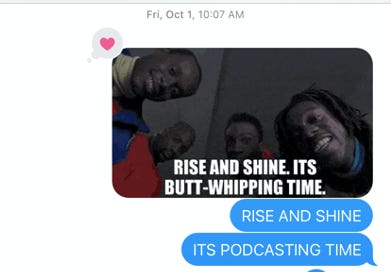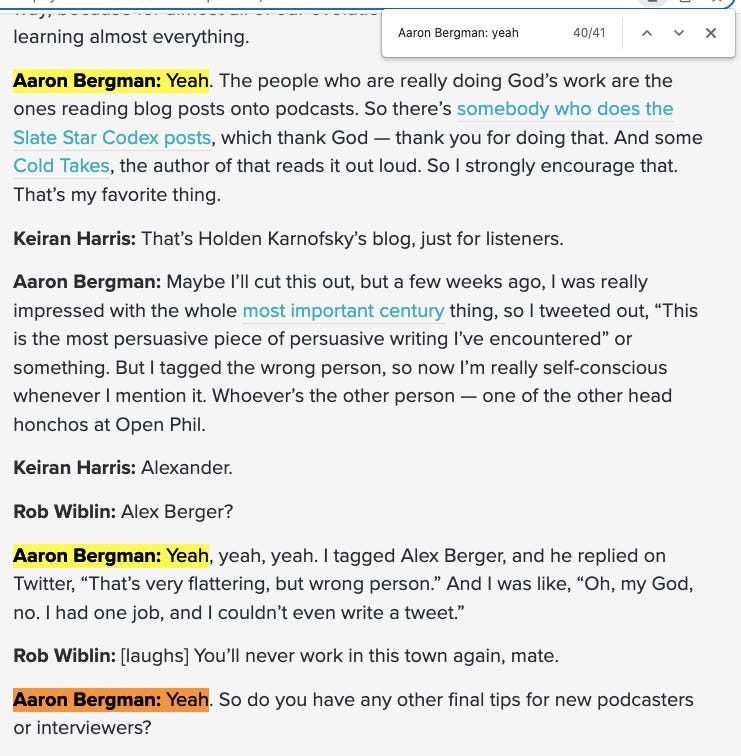^^That up there is a podcast episode of which I am part. Feel free just listen to my interview of “Rob [Wiblin] and Keiran [Harris] on the philosophy of The 80,000 Hours Podcast,” (on the 80k site here) but if you want the backstory you’ll have to keep reading.
Intro
This past summer, a few friends and I started up an effective altruism club at college. I thought it might be cool to start a podcast, and we did! It’s called All Good, and you can find it on:
This hosting website, which provides…
This RSS feed, which I do not understand the purpose, function, or structure of, but is apparently an important feature of blog-like content streams. I am deliberately choosing to remain blissfully ignorant, but here’s the Wikipedia page for “RSS” if you want to be more virtuous than me.

And, before I forget, eternal gratitude to the one person besides me and my co-host (tbh probably a member of my nuclear family) who gave us a review.
Backstory
The first thing we did was record an episode about cause prioritization. No guest, just Kearney (club cofounder and now president of EA Georgetown) and I talking casually about a Big, Important topic. I could tell immediately that the episode wasn’t fantastic, but initially thought that the ~6 hours or so I spent learning how to edit in GarageBand had made it good enough to ship.
I was wrong. Three distinct people, EA and non-EA alike, told me very politely that the episode was a piece of shit and should never see the light of day. So, I transferred the audio files to a flash drive, manually cut the flash drive into pieces, and buried the pieces in distinct locations in the dead of night.1
Take two.
The responsible move would have been to make sure we could produce an episode of value by ourselves before taking up an important person’s important time as a guest. Instead, I draft an email 80,000 Hours Podcast host Rob Wiblin and hit ‘send’ before my neocortex has time to intervene.
A few days later, it hits my inbox:
Oh shit, guess we’re doing this. A few weeks later:
Two guests? That’s more than I bargained for. Time to to prepare.
And we did! I’ll spare you the details, but it involved reading a lot of Rob’s old blog posts and a bunch of Google docs, one of which included this comment bubble that will forever live in my memory.
Fast forward, and it’s the night before we’re set to record. My circadian rhythm had spontaneously gone on vacation the previous evening, so I’ve been awake for about 36 hours. I tell Kearney—who has utterly failed to put a stop to this whole thing—to physically knock on my dorm room door2 and wake me up if I don’t appear to be lucid.
Around 7:30 pm, after a vicious battle, the underdog caffeine in my brain finally falls victim to the undefeated adenosine, and my circadian rhythm makes a sudden return. I wake up at exactly 11:30 pm, groggy and stressed, to spend a few hours feeling sorry for myself before falling back asleep.
Finally, it’s the morning of recording. I wake up, turn on my phone, and see this:
Uh oh…
She didn’t capitalize the name of יהוה. I say a quick שמע to extenuate the situation,3 and knew He heard my prayer when this hits my inbox:
Well either that or God had some beef with Rob (perhaps Rob forgot to capitalize s’יהוה name too?), because Rob has COVID. True, his being sick might be really bad for humanity’s prospects of a flourishing eternity, but at least I won’t make a fool of myself on camera. Phew. I go back to sleep.
We reschedule, and ten days later I find myself walking to the Georgetown campus library with a family-sized bottle of cold brew, my laptop, and enough cortisol to give a monk a panic attack.
Ok that’s not fair even as hyperbole, but it is directionally true; I don’t generally get anxious, and in fact often wish my stress response was a bit more reactive. This was not one of those times. I wasn’t “freaking out,” but I was viscerally nervous to an uncommon extent.

And then…it was kinda fine?
Aside: some commentary on this style of podcasting
As you’ll hear if you listen to the episode (or read the transcript), the 80k podcasting team has thought long and hard about Why Interviews Fail and how to make sure they don’t.
They’ve found that interviews turn out best—aesthetically, epistemically, and intellectually4—when everyone involved feels comfortable speaking, and that means:
Liberally re-recording - whenever someone (i.e. me) trips over words, loses their train of thought, or would just just prefer to word something differently. For instance:
Having the opportunity to cut and rearrange parts of the interview after recording.
Of course, Kearney and I were the interviewers and could have stipulated different ground rules, but we were more than happy to do things their way. Even setting aside how much more enjoyable the experience was for us, I think Rob and Keiran are spot-on in thinking that it makes for better, more interesting, and more informative content.
Compared to other types of recorded, non-scripted media (most podcasts, some talk radio, presidential debate), this is a pretty unusual. We talk about this “non-adversarial” structure and ethos plenty in the episode so I won’t discuss it a ton here, but only now am I realizing how utterly banal this seems in the context of a broader reference class.
Basically every other form of public media is heavily edited prior to being published. In fact, “edited” isn’t even the right word; make it “assembled” instead. Like 15 seconds ago, I wrote “fabricated” where “assembled” is now, immediately realized it wasn’t the right word, and found a replacement. I’d just call that “writing,” and it seems trivially obvious that using the backspace key while writing a blog post is good and normal.
One key feature of podcasts, though, is that they superficially seem to be an intimate and “natural” conversation. There are plenty of takes about how our brains regard voices in our earbuds almost as real friends talking to us, and I have no insight or strong opinion here.
But in one sense podcasts really are more like “real conversations” than other forms of media—and that because they’re unscripted. The combination of “unscripted” and “liberal do-overs” feels incongruous and maybe even disingenuous, but I think this precise combination gets you pretty close to the efficient frontier of nonfiction media.
As a listener, I feel the desire to be able to hear the original uncut recording (the dot to the right of the red curve), but this basically a fabricated option!
A quick demonstration
To show how much lower quality my writing would be if I couldn’t make changes or edits on the fly, I recorded my screen while typing whatever came to mind. It’s sped up to 4x by default, so set the video to 0.25 speed if you want the IRL version.
After a few more edits post-video, we can see that this:
Alright, let’s see what happens when I try to write without being able to make any changes. I’m already typing more slowly, and feel somewhat nervous even though the stakes are below my ankles. I even hit backspace three times b - four times - now by accident despite indenting (lol) not to.
transforms into
Let’s see what happens if I try to type without making changes. My writing slows, and I can feel the socially-oriented part of my brain reviewing each keystroke. This doesn’t make for good writing, and, more importantly perhaps, it doesn’t make for honest writing either.
Judge for yourself, but I think the second paragraph is better written and more informative despite being shorter (in both characters and words) than the first. Not exactly surprising, but interesting to see! Ok, back to the show…
Back to the story
Where was I? Right, I’m in a random study room in the second floor of Lauinger Library, about to have a recorded Zoom conversation with Rob and Keiran. And, at this point, I honestly don’t trust my autobiographical memory to give any more insight than what you can actually hear on the recording.
No, I’m not going to put the uncut audio here, but I will say that most of the ~60 minutes (almost 40% of recorded time) that did get cut was me generally being incoherent (see the video above). So you’re not missing out on anything juicy.
Finally, after two hours, 46 minutes, and 31 seconds of recording, I say goodbye, close out out of Zoom, and walk into the main floor of the library where other students were talking and studying.
I watched the little Google Drive circular progress bar fill up with radians as the ~1gb audio/video file slowly uploaded. Mercifully, the wifi was slow enough that my heart’s BPM rate had time to return to double digits while I waited. Since Kearney had left part way through the interview and I didn’t recognize anyone around, the vibe was pretty:
Then, the next day, 80,000 Hours published it on their website and everyone lived happily ever after.
Just kidding, it actually took about three months to hear anything further.
Which was fine! Their team was busy recording an bunch of other episodes and putting ours through whatever magical combination of brute force human labor and machine learning filters turns almost 10,000 seconds (or 35 µc5) of audio into an 80,000 Hours-quality, coherent, not-terribly-embarrassing-for-me (though opinions may differ) episode, complete with a page for highlights, a summary, relevant links, and an almost 25,000 word (or 6.34 µW6) transcript.
Anyway, almost nine months7 after sending an email I thought I’d come to regret, the episode named “Rob and Keiran on the philosophy of The 80,000 Hours Podcast” was born on Feb 28, 2022 at a healthy length of 173 minutes and weight of 55 megabytes. I am finally back from podcasting leave, which means (I hope) this blog will get a little more attention. If (and only if - don’t do it for my sake) you think you might find it interesting, give it a listen!
Epilogue: bloopers
A few things I failed to include above:
Of the 78 distinct times I spoke, I managed to start a question or response with “yeah” on 41 of them.I have been reminded that these stats are from the interview as published; I can only imagine how many “Aaron Bergman: Yeah”s there would have been in an uncut transcript.
The episode I describe in this screenshot^^
Using a word so arcane and pretentious that no one at 80k could figure out what I was trying to say, so I had to tell them to manually edit the transcript to change “[inaudible]” to “locus.”
This whole audio escapade:
a) Deciding to buy a steeply discounted external microphone (whose undiscounted price was like $25), which I soon realized was in fact worse than my 2017 laptop’s built-in system.
b) Making the pretty blatant sunk cost fallacy-driven error of refusing to buy another microphone because the first one didn’t work, and recording the episode I spent dozens of hours prepping for on shitty computer audio.
c) Someone hearing the episode and deciding the audio quality was so bad that he shipped me a super nice, professional quality microphone.
d) Me deciding that a nice, creative way to say thanks would be to record a brief message on the new mic and send him the audio file.
e) Trying to do just this but somehow fucking up in GarageBand and in fact recording the “thank you for the microphone you sent because my audio sucked” with equally poor audio.
I know “transferring” file a doesn’t actually work like that.
If you were of voting age during either Obama campaign: knocking on doors is a relic of a bygone era.
This is like the one line that didn’t actually happen.
I’m thinking of “epistemically” as “believing true things and not false things” and “intellectually” as “having lots of interesting and valuable ideas.” Like, you might think that a religious scripture is intellectually good but epistemically bad.
µc is a unit I just made up which stands for micro-careers, or one-millionth of an 80,000 hour career. It works out to a surprisingly sensible 4.8 minutes.
µW is another unit I just made which stands for micro-Wikipedias, or one-millionth of the number of words in all English language Wikipedia pages. It works out to about 3,900 words or twice the length of this blog post.
Ok fine, it was actually a bit under eight months. But nine is funnier.


























Share this post